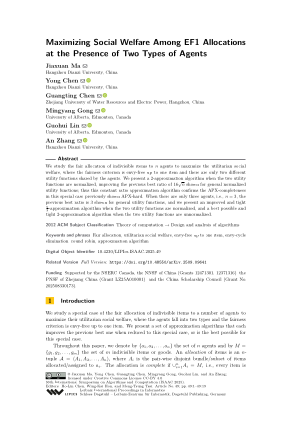Maximizing Social Welfare Among EF1 Allocations at the Presence of Two Types of Agents
Authors
Jiaxuan Ma,
Yong Chen  ,
Guangting Chen
,
Guangting Chen  ,
Mingyang Gong
,
Mingyang Gong  ,
Guohui Lin
,
Guohui Lin  ,
An Zhang
,
An Zhang 
-
Part of:
Volume:
36th International Symposium on Algorithms and Computation (ISAAC 2025)
Part of: Series: Leibniz International Proceedings in Informatics (LIPIcs)
Part of: Conference: International Symposium on Algorithms and Computation (ISAAC) - License:
 Creative Commons Attribution 4.0 International license
Creative Commons Attribution 4.0 International license
- Publication Date: 2025-11-27
File

PDF
LIPIcs.ISAAC.2025.49.pdf
- Filesize: 0.77 MB
- 19 pages
Document Identifiers
Related Versions
- Full Version https://doi.org/10.48550/arXiv.2509.09641
Subject Classification
ACM Subject Classification
- Theory of computation → Design and analysis of algorithms
Keywords
- Fair allocation
- utilitarian social welfare
- envy-free up to one item
- envy-cycle elimination
- round robin
- approximation algorithm
Metrics
- Access Statistics
-
Total Accesses (updated on a weekly basis)
0PDF Downloads0Metadata Views
Abstract
We study the fair allocation of indivisible items to n agents to maximize the utilitarian social welfare, where the fairness criterion is envy-free up to one item and there are only two different utility functions shared by the agents. We present a 2-approximation algorithm when the two utility functions are normalized, improving the previous best ratio of 16 √n shown for general normalized utility functions; thus this constant ratio approximation algorithm confirms the APX-completeness in this special case previously shown APX-hard. When there are only three agents, i.e., n = 3, the previous best ratio is 3 shown for general utility functions, and we present an improved and tight 5/3-approximation algorithm when the two utility functions are normalized, and a best possible and tight 2-approximation algorithm when the two utility functions are unnormalized.
Cite As Get BibTex
Jiaxuan Ma, Yong Chen, Guangting Chen, Mingyang Gong, Guohui Lin, and An Zhang. Maximizing Social Welfare Among EF1 Allocations at the Presence of Two Types of Agents. In 36th International Symposium on Algorithms and Computation (ISAAC 2025). Leibniz International Proceedings in Informatics (LIPIcs), Volume 359, pp. 49:1-49:19, Schloss Dagstuhl – Leibniz-Zentrum für Informatik (2025)
https://doi.org/10.4230/LIPIcs.ISAAC.2025.49
BibTex
@InProceedings{ma_et_al:LIPIcs.ISAAC.2025.49,
author = {Ma, Jiaxuan and Chen, Yong and Chen, Guangting and Gong, Mingyang and Lin, Guohui and Zhang, An},
title = {{Maximizing Social Welfare Among EF1 Allocations at the Presence of Two Types of Agents}},
booktitle = {36th International Symposium on Algorithms and Computation (ISAAC 2025)},
pages = {49:1--49:19},
series = {Leibniz International Proceedings in Informatics (LIPIcs)},
ISBN = {978-3-95977-408-6},
ISSN = {1868-8969},
year = {2025},
volume = {359},
editor = {Chen, Ho-Lin and Hon, Wing-Kai and Tsai, Meng-Tsung},
publisher = {Schloss Dagstuhl -- Leibniz-Zentrum f{\"u}r Informatik},
address = {Dagstuhl, Germany},
URL = {https://drops.dagstuhl.de/entities/document/10.4230/LIPIcs.ISAAC.2025.49},
URN = {urn:nbn:de:0030-drops-249570},
doi = {10.4230/LIPIcs.ISAAC.2025.49},
annote = {Keywords: Fair allocation, utilitarian social welfare, envy-free up to one item, envy-cycle elimination, round robin, approximation algorithm}
}
Author Details
Funding
Supported by the NSERC Canada, the NNSF of China (Grants 12471301, 12371316), the PNSF of Zhejiang China (Grant LZ25A010001), and the China Scholarship Council (Grant No. 202508330173).
References
-
G. Amanatidis, H. Aziz, G. Birmpas, A. Filos-Ratsikas, B. Li, H. Moulin, A. A. Voudouris, and X. Wu. Fair division of indivisible goods: Recent progress and open questions. Artificial Intelligence, 322:Article 103965, 2023.

-
G. Amanatidis, G. Birmpas, A. Filos-Ratsikas, and A. Voudouris. Fair division of indivisible goods: A survey. In Proceedings of IJCAI 2022, pages 5385-5393, 2022.

- H. Aziz, X. Huang, N. Mattei, and E. Segal-Halevi. Computing welfare-maximizing fair allocations of indivisible goods. European Journal of Operational Research, 307:773-784, 2023. URL: https://doi.org/10.1016/J.EJOR.2022.10.013.
-
S. Barman, U. Bhaskar, and N. Shah. Optimal bounds on the price of fairness for indivisible goods. In Proceedings of WINE 2020, pages 356-369, 2020.

- X. Bei, X. Lu, P. Manurangesi, and W. Suksompong. The price of fairness for indivisible goods. Theory of Computing Systems, 65:1069-1093, 2021. URL: https://doi.org/10.1007/S00224-021-10039-8.
-
X. Bu, Z. Li, S. Liu, J. Song, and B. Tao. Approximability landscape of welfare maximization within fair allocations. In Proceedings of EC 2025, pages 412-440, 2025.

-
E. Budish. The combinatorial assignment problem: Approximate competitive equilibrium from equal incomes. Journal of Political Economy, 119:1061-1103, 2011.

- I. Caragiannis, D. Kurokawa, H. Moulin, A. Procaccia, N. Shah, and J. Wang. The unreasonable fairness of maximum Nash welfare. ACM Transactions on Economics and Computation, 7:12:1-12:32, 2019. URL: https://doi.org/10.1145/3355902.
-
R. Lipton, E. Markakis, E. Mossel, and A. Saberi. On approximately fair allocations of indivisible goods. In Proceedings of EC 2004, pages 125-131, 2004.

- J. Ma, Y. Chen, G. Chen, M. Gong, G. Lin, and A. Zhang. Maximizing social welfare among EF1 allocations at the presence of two types of agents. CoRR, 2025. URL: https://arxiv.org/abs/2509.09641.
-
H. Steinhaus. Sur la division pragmatique. Econometrica, 17:315-319, 1949.

-
H. Varian. Equity, envy and efficiency. Journal of Economic Theory, 9:63-91, 1974.

